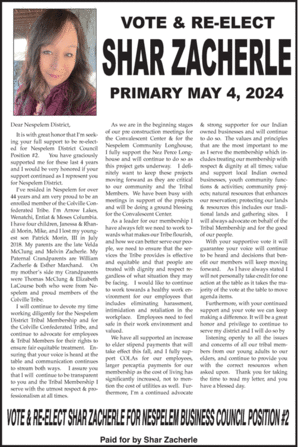Internecine arguing makes case for municipal merger
Editorial
Last updated 3/23/2016 at 9:46am
Two examples glare in the news this week, showing why consolidating local towns into one city would make so much sense.
It’s far from clear that consolidation would actually cut down on personnel or save as much money as one might assume, but freeing oneself from a doomed mindset isn’t about the money it would save.
Such a mindset currently steers the actions city councils in Grand Coulee and Electric City must believe they have to follow. It’s a mindset that draws needless distinctions between the two, when in truth, the people could be served far better and more efficiently if those distinctions disappeared or were ignored.
Consider the latest spat on the water relationship between those two cities. Grand Coulee buys its water from Electric City, which was fortunate enough to locate on top of an aquifer that met the required federal restrictions for drinking water — that is, until the feds raised the allowable threshold for arsenic. Grand Coulee doesn’t think it should have to pay a share for the first 20 months or so of Electric City’s new arsenic filtration plant’s operation because the two cities hadn’t signed an agreement yet. The water, almost 80 percent of what Electric City pumps, was flowing to Grand Coulee homes and businesses, however.
Grand Coulee’s position is ridiculous, of course, and might even be called childish. But that would miss the bigger problem, which the two cities have been missing for years: they wouldn’t have to bill each other at all if there was only one city.
The same principle applies to the whole police contract near-fiasco the two municipalities were embroiled in for months, but we don’t have enough space for that today, because we need to address the “mindset” mentioned earlier.
That can be seen even more glaringly in Electric City’s decision to gut its spending on regional tourism promotion in favor of a nice trail through the city that would cost millions. The trail might not benefit all the motels and campgrounds in the area, but at least it would be owned by and exist inside of Electric City. Never mind that the intent of the law that allows collection of the lodging tax was to promote tourism, not provide a stake against which any civic project could seek outside grant funding.
The pathway itself may not be a bad idea, if that’s what the people want, but to say it would attract more tourists to an area already blessed with lakes, sunny skies and the eighth wonder of the world is to advocate tackling a problem that doesn’t exist. So dedicating several years’ worth of lodging tax to it, long before the city has even asked the public for its opinion on the whole idea, smacks of something other than civic leadership, and is arguably illegal. And now, according to tourism interests who met on the question last week, it will be argued.
Reasonable people of good will shouldn’t need lawyers to work things out. Fortunately for lawyers, not everyone is reasonable, but they can be electable. Consolidating the cities could allow for electing half as many.
Scott Hunter
editor and publisher



Reader Comments(0)